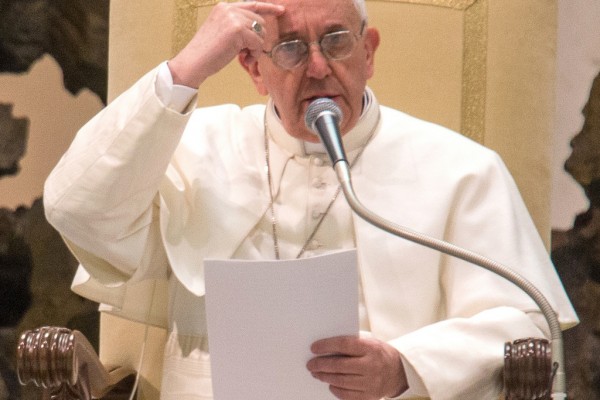
The Catholic Church time and again has proven controversial for varying reasons. Recently elected Pope Francis is the center of a recent controversial issue; he is being scrutinized and criticized for a statement made during his homily that is construed as “heretic.” The Catholic Church and Protestant Christian denominations both teach that Jesus is “the way, the truth and the life,” as written in the Holy Bible. “No one comes to the Father except through me,” Jesus declares in the Book of John. The way that the Catholic Church differs from other Christian denominations in the teaching of this doctrine is that they believe that salvation is achieved by having faith and doing good works, while most non-Catholic Christian denominations teach that having faith in Christ alone is sufficient for salvation. With all this as a background of the discussion, is the pope necessarily being heretic when he says that “The Lord has redeemed all of us, all of us, with the Blood of Christ; all of us, not just Catholics. Everyone! ‘Father, the atheists? Even the atheists. Everyone! And this blood makes us children of God of the first class! We are created children in the likeness of God and the blood of Christ has redeemed us all.” Is he being too inclusive and therefore dismissive of the fact that one must believe and do good in order to be saved? The slippery slope in this reasoning is there would be no moral and religious standard to salvation; just about anybody could be saved. But if one were to look at this positively, it is a resonant message on the unconditional quality of Jesus’ love.
The issue of whether Pope Francis was being heretical raises a question on the very character of the God that Christians believe in. Is he first and foremost a judge or a messiah? Does he carry the character of the God of the Old Testament, who commanded rain for forty days and forty nights to punish sinners, or the God of the New Testament, who dined with the tax collectors and rebuked those who were about to stone Mary Magdalene to death? In the book of Mark, Jesus confirms his all-inclusive and non-selective love, echoing the same kind of undiscriminating compassion that Pope Francis did. Jesus says, “Healthy people don’t need a doctor — sick people do. I have come to call not those who think they are righteous, but those who know they are sinners.” It may be deduced from here then that Jesus blood was “shed for you and for all,” as is said in a Eucharistic prayer. However, according David Gibson of religionnews.com, that portion of the prayer has been changed to “for you and for many”, favoring an “effective exclusion” as opposed to an “antecedent inclusion” of mankind, as Rev. Paul Philibert mentions, quoted by religionnews.com. Whether or not Jesus died for “all” and “for many” may be a debate that would be hard to resolve. What is apparent is the outcry from Catholics and non-Catholics alike in response to Pope Francis’ generous inclusion of nonbelievers and atheists. It seems that the world is just not ready for the pope’s seemingly “universalist” bent on the idea of salvation.
We might just be a tad bit too quick to judge. After all, it is not news that Jesus died for sinners (meaning, everybody). Pope Francis may be merely reiterating that Jesus welcomes not just those who are righteous, but sinners as well. He is merely providing a testimony to the power of God’s love and his work on the cross. After all, isn’t the pope God’s vicar on earth? He is the messenger of a loving and merciful God.
